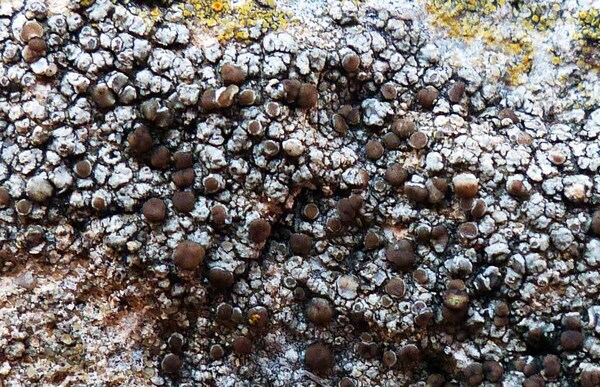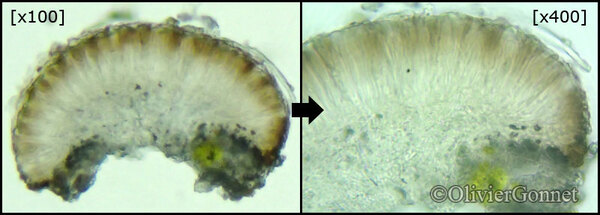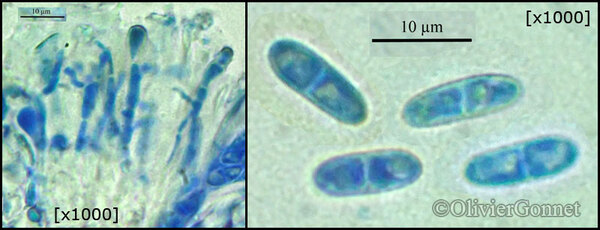Lecania turicensis (Hepp) Müll. Arg.
Flora, 55: 386, 1862. Basionym: Biatora turicensis Hepp - Fl. Eur.: 8, 1853.
Synonyms: Biatorina albariella (Nyl.) Arnold; Biatorina proteiformis A. Massal.; Biatorina proteiformis var. dispersa A. Massal.; Biatorina rabenhorstii var. turicensis (Hepp) Anzi; Biatorina turicensis var. farinosa A. Massal.; Lecania albariella (Nyl.) Müll. Arg.; Lecania erysibe f. dispersa (A. Massal.) Zahlbr.; Lecania erysibe var. proteiformis (A. Massal.) Boistel; Lecania farinosa (A. Massal.) B. de Lesd.; Lecania phaeoleucodes (Nyl.) Zahlbr.; Lecania proteiformis (A. Massal.) Arnold; Lecania subcaesia (Nyl.) B. de Lesd.; Lecaniella rabenhorstii var. turicensis (Hepp) Jatta; Thalloidima barbeyanum Müll. Arg.?; Toninia barbeyana (Müll. Arg.) Zahlbr.?
Description: Thallus crustose, up to 0.6 mm thick, granular to irregularly areolate, white to pale grey, usually pruinose, the areoles, when developed, 0.3-1.5 mm wide, flat, smooth, corticate, the cortex c. 15–20 μm thick. Apothecia lecanorine, scattered and rounded to crowded and slightly deformed, broadly sessile, up to 0.8(-1) mm across, with a flat to slightly convex, reddish brown to black, often white-pruinose disc (slightly paler and dark-spotted, with a dark pigmented edge when wet), and a thin, pale grey-white pruinose thalline margin which is often excluded in old apothecia (with a few algal cells restricted to the lower edges of the apothecium). Thalline exciple 70–100 μm thick, cupular, densely packed with photobiont cells, with a 15–20 μm thick, colourless or reddish brown outer layer; epithecium brown- to brown-black-spotted, the pigment sometimes partly extending deeper into hymenium; hymenium colourless below, (50-)55-75(-80) µm high, not inspersed with oil droplets; paraphyses strongly coherent, mostly simple, (1.5-)2-2.5 µm thick, the apical cells strongly clavate, up to 6(-7) µm wide; hypothecium colourless, inspersed with scattered oil droplets, 50-100 µm high. Asci 8-spored, clavate, with a K/I+ blue tholus and a central non-amyloid area, Bacidia-type. Ascospores 1-septate, hyaline, ellipsoid or oblong-fusiform, straight, not constricted at septum, thin-walled, (8-)10-15(-18) x (4-)4.5-5.5(-6) µm, without a gelatinous perispore. Pycnidia rare, immersed, dark-brown or black around the ostiole. Conidia thread-like, mostly strongly curved, 12-20 x c. 0.8 µm. Photobiont chlorococcoid. Spot tests: thallus K-, C-, KC-, P-, UV-. Chemistry: without lichen substances.
Growth form: Crustose
Substrata: rocks
Photobiont: green algae other than Trentepohlia
Reproductive strategy: mainly sexual
Commonnes-rarity: (info)
Alpine belt: absent
Subalpine belt: absent
Montane belt: rather rare
Dry submediterranean belt: very common
Humid submediterranean belt: very common
Padanian area: rather rare
pH of the substrata:
1 2 3 4 5
Solar irradiation:
1 2 3 4 5
Aridity:
1 2 3 4 5
Eutrophication:
1 2 3 4 5
Poleotolerance:
0 1 2 3
Altitudinal distribution:
1 2 3 4 5 6
Rarity
absent
extremely rare
very rare
rare
rather rare
rather common
common
very common
extremely common
Loading data...
Occurrence data
Predictive map
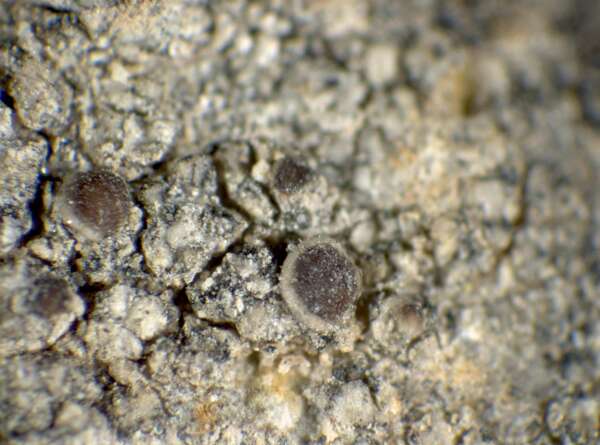
P.L. Nimis; Owner: Department of Life Sciences, University of Trieste
Herbarium: TSB (14170)
2002/01/02
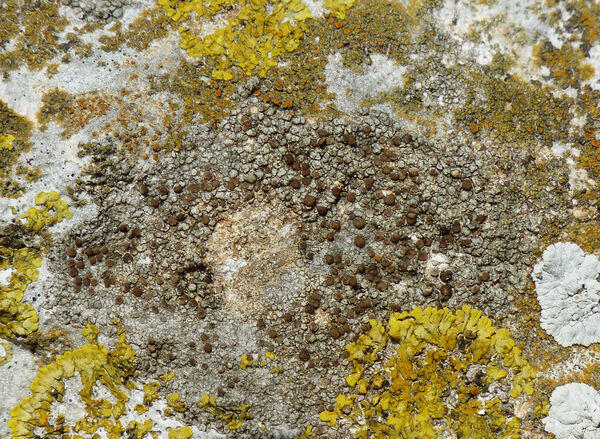
Andrea Moro; Owner: Department of Life Sciences, University of Triedte
Italy, Friuli Venezia Giulia, Trieste, Trieste Karst, Rocca di Monrupino
20/02/2017
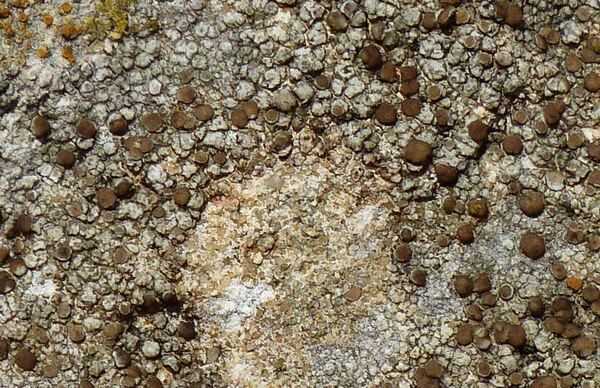
Andrea Moro; Owner: Department of Life Sciences, University of Triedte
Italy, Friuli Venezia Giulia, Trieste, Trieste Karst, Rocca di Monrupino
20/02/2017
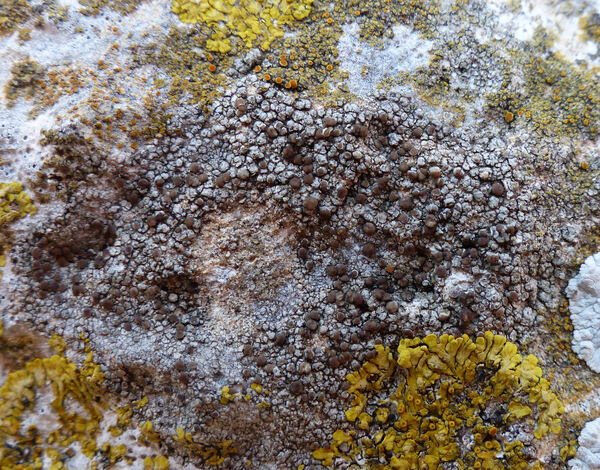
Andrea Moro; Owner: Department of Life Sciences, University of Triedte
Italy, Friuli Venezia Giulia, Trieste, Trieste Karst, Rocca di Monrupino
20/02/2017
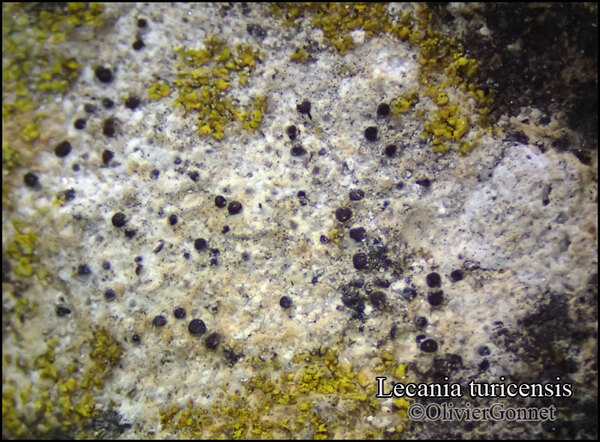
Courtesy Danièle et Olivier Gonnet - Source: https://www.afl-lichenologie.fr/Photos_AFL/Photos_AFL_L/Texte_L_3/Lecania_turicensis.htm
France, session AFL 2015 - Saint-Sozy - Lot
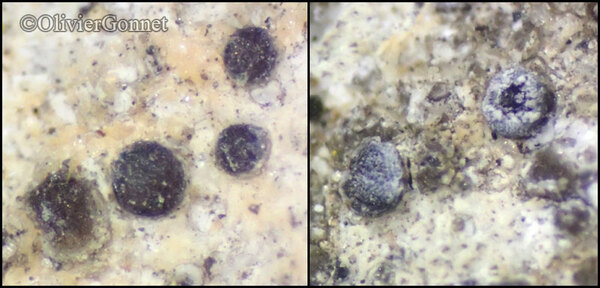
Courtesy Danièle et Olivier Gonnet - Source: https://www.afl-lichenologie.fr/Photos_AFL/Photos_AFL_L/Texte_L_3/Lecania_turicensis.htm
France, session AFL 2015 - Saint-Sozy - Lot
Growth form: Crustose
Substrata: rocks
Photobiont: green algae other than Trentepohlia
Reproductive strategy: mainly sexual
Commonnes-rarity: (info)
Alpine belt: absent
Subalpine belt: absent
Montane belt: rather rare
Dry submediterranean belt: very common
Humid submediterranean belt: very common
Padanian area: rather rare
pH of the substrata:
| 1 | 2 | 3 | 4 | 5 |
Solar irradiation:
| 1 | 2 | 3 | 4 | 5 |
Aridity:
| 1 | 2 | 3 | 4 | 5 |
Eutrophication:
| 1 | 2 | 3 | 4 | 5 |
Poleotolerance:
| 0 | 1 | 2 | 3 |
Altitudinal distribution:
| 1 | 2 | 3 | 4 | 5 | 6 |
Rarity
absent
extremely rare
very rare
rare
rather rare
rather common
common
very common
extremely common
Loading data...
Occurrence data
Predictive map

P.L. Nimis; Owner: Department of Life Sciences, University of Trieste
Herbarium: TSB (14170)
2002/01/02

Andrea Moro; Owner: Department of Life Sciences, University of Triedte
Italy, Friuli Venezia Giulia, Trieste, Trieste Karst, Rocca di Monrupino
20/02/2017

Andrea Moro; Owner: Department of Life Sciences, University of Triedte
Italy, Friuli Venezia Giulia, Trieste, Trieste Karst, Rocca di Monrupino
20/02/2017

Andrea Moro; Owner: Department of Life Sciences, University of Triedte
Italy, Friuli Venezia Giulia, Trieste, Trieste Karst, Rocca di Monrupino
20/02/2017

Courtesy Danièle et Olivier Gonnet - Source: https://www.afl-lichenologie.fr/Photos_AFL/Photos_AFL_L/Texte_L_3/Lecania_turicensis.htm
France, session AFL 2015 - Saint-Sozy - Lot



